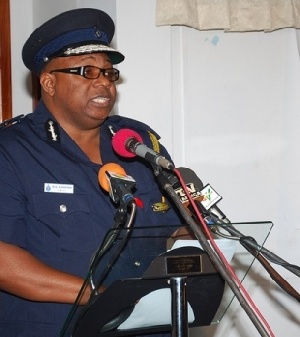The Ghana Police Service has been dragged to the Judgment Debt Commission over non-payment of salary arrears of 17 police officers who were wrongly dismissed in 2007.
Counsel for the affected officers, Joseph Kofi Yeboah, yesterday served notice that he would be compelled to go to court to garnishee the properties of the Police Service including the police headquarters and sell them if the security agency failed to pay his clients.
Mr. Yeboah of Akuafo Chambers told the sole commissioner investigating judgment debt and compensation payments to institutions and individuals, Justice Yaw Apau, that his clients were dismissed in 2007 after a police service inquiry.
The affected officers, he pointed out, were dismissed for allegedly divulging information to the press during a misunderstanding between them and their commander at the Police Training School in Accra in contravention of the Police Service Act.
He said even though the dismissals were quashed and his clients reinstated in 2010 as directed by an Accra Fast Track High Court, the Police Service failed to comply with the other directives of the court to pay their three year’s salary arrears from 2007-2010 and allowances with full benefits that were due them.
Speaking to the issues in a petition which he presented to the Judgment Debt Commission, Mr. Yeboah urged the sole commissioner to intervene or else he would be pushed to drag the Police Service to court and demand interest on the salary arrears.
“We have submitted this petition to the commission, praying the commission to intervene on behalf of the affected police personnel for the police administration to pay their salary arrears, their allowances and other benefits as ordered by the Fast Track High Court in 2010, which the police administration has refused to do,” Mr. Yeboah prayed.
Giving the background to the case, he indicated his clients were serving police personnel in the Ghana Police Service but were dismissed in 2007 following a “purported police service inquiry.”
This inquiry, Mr. Yeboah pointed out, emanated from “a purported misconduct” on the part of the affected police personnel in contravention of the Police Service Act.
He said his law firm applied for an order of mandamus for the police/Inspector General of Police (IGP) to give them the inquiry report, which was granted.
Mr. Yeboah said after studying the report, they realized that the whole service inquiry was unlawful and hence a certiorari application was filed in court to quash the dismissal.
He said the court, upon examining the facts of the case, came to the conclusion that the police officers’ dismissal was wrong and therefore quashed same.
According to him, the Police Service had appeared in court a couple of times and contested the case by asking the court to set the application aside, but failed to appear on the judgment day.
In its application, the police averred that the Attorney-General (A-G) was not joined in the suit; hence the case should be dismissed.
“But we argued that we came under Article 32 of the Constitution and not under Article 85 (5) of the Constitution, which requires the Attorney-General to be joined in the case.”
The court, he maintained, concluded that they did not need to join the A-G, and the application to have the certiorari set aside was dismissed.
Mr. Yeboah said after the dismissal of the application, counsel for the affected police personnel wrote to the police administration to comply with the High Court order that the officers should be reinstated with their salary arrears, allowances and benefits paid in full.
“My lord, we wrote this letter for over nine months to about two years. We never heard anything and we were forced to apply to the High Court for contempt against the Police Service, but our clients advised that we should have this matter resolved,” Mr. Yeboah stated.
He said while the contempt case was pending, the police “capitulated” and wrote to the affected officers that they had accepted the High Court ruling and that “my clients would be given training and be restored with full salary and all the allowances” as well as salary arrears paid.
However, Mr. Yeboah was worried that three years after making this commitment, the police administration failed to fulfil their promise.
The police service, he disclosed, only informed him that they had written a letter to the Ministry of Finance, requesting for money to pay the salary arrears.
“However, my checks at the Ministry of Finance indicated there was no such letter and if I send someone or I go to the police myself, they would not even have the courtesy of acknowledging my presence,” Mr. Yeboah lamented.
Christina Esi Bobobee, the Administrator of the Office of the Stool Lands, yesterday urged the sole commissioner to invite the Attorney-General to help settle the controversy over which state institution is constitutionally mandated to collect and pay all revenues/compensation for stool lands.
The Office of Administrator of Stool Lands and the Lands Commission Division of the Lands Commission had been embroiled in a tug-of-war as to which of them had been constitutionally mandated to collect and pay royalties/compensations on stool lands.
Mrs. Bobobee had told the sole commissioner their powers had been usurped by Land Valuation Division of the Lands Commission with regard to compensation for stool lands because of a letter written by former Attorney-General Joe Ghartey.
According to her, the Attorney-General’s testimony at the Judgment Debt Commission would help resolve the issue once and for all.
General News of Tuesday, 5 November 2013
Source: Daily Guide
Police service hot over 17 officers
Entertainment












